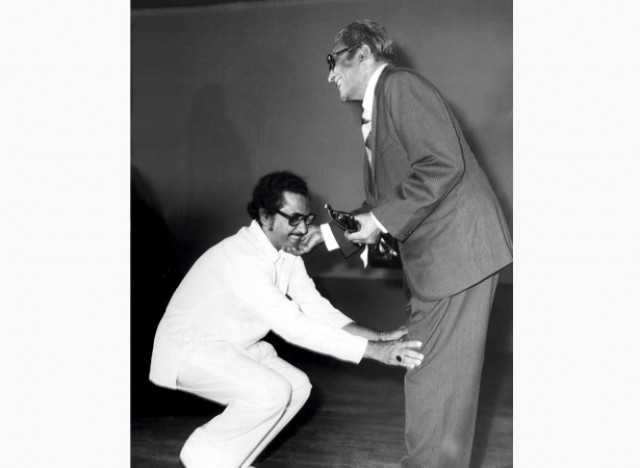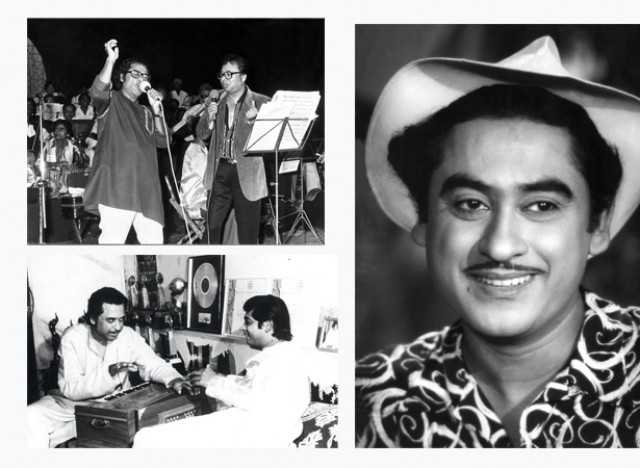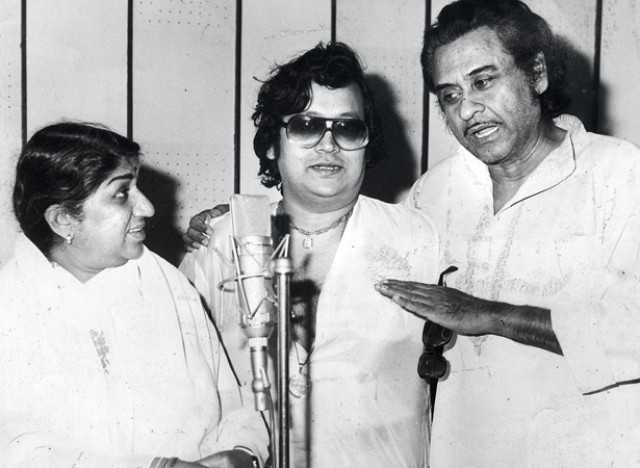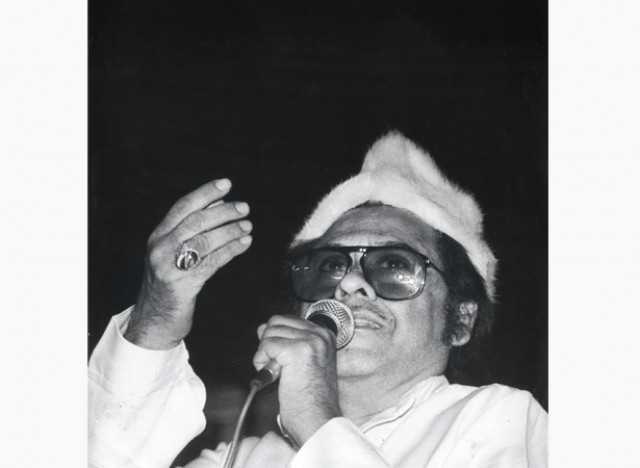What can one say about a man who famously admitted that trees were his only friends? Who revealed he was conned into being an actor and did everything he could to discourage people from making him act. Who was tired of singing in the conventional way and would yodel impromptu during recordings. A man who grimaced like a clown but managed to romance some of the most beautiful women in filmdom on screen and off it. A man who could sing, dance, act, compose, direct – often in his own distinct manner and yet win accolades…
Platitudes such as ‘one in a million’ come to mind when writing about him. But Kishoreda, if he was alive, would have just flaunted his all-knowing smile, rolled his eyes and probably asked for a million bucks instead. The truth is that you can line up all the singers of the industry on one side and put Kishoreda on the other and he would still stand out, given his versatility and his outrageous popularity…

Receiving the Filmfare trophy at the hands of elder brother Ashok Kumar
Bright beginnings
Kishore Kumar spoke flawless Hindi, despite being a Bengali as he was born and brought up in Khandwa, Madhya Pradesh. He was born as Abhas Kumar Ganguly on August 4, 1929. His father Kunjalal Ganguly was a lawyer. Kishore was the youngest of four siblings; the other three were Ashok, Sati Devi and Anoop. There was an 18-year gap between oldest brother Ashok and Kishore. Ashok became a star when Kishore was still a child. Story goes that young Kishore used to mimic the famous singers of his era and was a hit during family gatherings. He was known to ask for one anna to sing his brother’s songs and four annas to sing his idol, KL Saigal’s. He didn’t have formal training in singing. He had a naturally gifted voice and an ear for tunes. The latter came in handy while recording difficult songs. For instance, he took home a tape of Lata Mangeshkar’s version of the classical based Mere naina saawan bhadon (Mehbooba – 1976), listened to it for a week and then recorded his portions with ease.
Mumbai talkies
Incidentally, brother Ashok Kumar was a big star and a part owner Bombay Talkies studio. Kishore started his singing career as a chorus singer in the films produced by the studio. His big break came when composer Khemchand Prakash gave him a chance to sing for the new star on the horizon, Dev Anand for Ziddi (1948). The song, Marne ki duayen kyun maangu, sung in KL Saigal style, became a hit. A life-long friendship between Dev and Kishore was forged. Kishore was also offered roles and acted in films like Andolan (1951), directed by Phani Majumdar, Bimal Roy’s Naukri (1954) and Hrishikesh Mukherjee’s directorial debut Musafir (1957). These were dramas that highlighted his sensitivity as an actor and not madcap comedies for which he later became famous. Salil Chowdhury, the music director for Naukri, gave him the song Chhota sa ghar hoga, which got him noticed in the music circuit.

Perfroming with RD Burman (on top) and Rehearsing with son Amit Kumar (below)
Romance and more
It was SD Burman who advised him to stop copying Saigal and form his own style. Dada Burman thought Kishore’s voice best suited soft romantic numbers and gave him many songs like Maana janaab ne pukara nahi (Paying Guest-1957), Hum hain rahi pyar ke (Nau Do Gyarah - 1957) and Haal kaisa hai janaab ka (Chalti Ka Naam Gaadi - 1958), to name a few. These, along with the earlier released Aasha (1957) and Half Ticket (1962), crowned him as a numero uno comic actor. Chalti Ka Naam Gaadi was also where his romance with co-star Madhubala blossomed. He was married to singer-actress Ruma Guha Thakurta at the time and had a son, Amit by her. He divorced Ruma Devi to marry Madhubala in 1960. Theirs was a short-
lived happiness. Madhubala suffered from a congenital heart disease. Kishore even travelled with her to London in search of a cure. But apparently the doctors were wary of operating on her. The couple returned disheartened. Madhubala got weaker by the day and was bedridden most of the time in the coming years, before finally bidding adieu in 1969. In 1976, he tied the knot with Yogeeta Bali but divorced her after two years. He then married Leena Chandravarkar in 1980 and remained married to her till his death seven years later. His other son, Sumit, is her child.
Reign man
Perhaps, Madhubala’s death fuelled a sense of disillusionment towards the fickle industry. Kishore started developing a reputation of being a difficult actor. His films started flopping and his playback career too suffered. Only old faithfuls like SD Burman and RD Burman were offering him work. He wasn’t rated at par with Mohammed Rafi or Mukesh. But he could produce some great work even in these troubled times. He acted in, produced, directed and even gave music to arguably the best film of his career, Door Gagan Ki Chaon Mein (1964). He also appeared in a supporting role in the outrageous comedy Padosan (1968), in which his song duel with Manna Dey, Ek chatur naar, remains an unparalleled feat. Soon his fortunes were to change for the better. Aradhana (1969), starring the next superstar Rajesh Khanna, made him the overnight singing sensation all over again, with songs like Mere sapnon ki rani and Roop tera mastana, proving more popular than Rafi numbers, Baghon mein bahar hai and Gunguna rahen hai bhanwaren from the same film. Kishore won his first Filmfare Award for Roop tera mastana and went on to win seven more — a record. The controversy created around Tum bin jaoon kahan song from Pyar Ka Mausam (1969), further boosted his career. The song was sung for different moods by both Rafi and Kishore but Kishore’s version turned more popular. Then on from 1969 to his death in 1987, Kishore reigned supreme for close to twenty years.

New heights
The Kishore-Rajesh Khanna combination produced such gems as Pyar deewana hota hai (Kati Patang –1972), O mere dil ke chain (Mere Jeevan Saathi – 1972), Jai jai Shiv Shankar (Aap Ki Kasam –1974) and many more. Such was his popularity that even Dilip Kumar, who had always chosen Rafi as his voice, had to succumb to Kishore’s magic in Sagina (1974). Saala main to sahab ban gaya from the film still remains popular. He became the voice for all the popular actors of the ’70s and the ’80s, be it Amitabh Bachchan, Dharmendra, Shashi Kapoor, Sunil Dutt, Vinod Khanna et al. He formed a winning combo with every music director, be it RD Burman, Laxmikant-Pyarelal, Kalyanji-Anandji, Bappi Lahiri, Ravi, Khayyam and even Hridyanath Mangeshkar. He could afford to refuse giving playback to the reigning superstar Amitabh Bachchan during the mid-’80s, when he allegedly refused to do a guest appearance in Kishore’s Mamta Ki Chaon Mein. They patched up later and he sang for Amitabh for Shahenshah (1988) and Toofan (1989), unfortunately both released after Kishore’s death. His songs were banned on AIR by Sanjay Gandhi when Kishore refused to sing for the Congress party. A delegation of eminent filmmakers got together to get the ban lifted. For a brief period, he didn’t sing for Mithun Chakraborty when his erstwhile wife Yogeeta Bali got married to the actor.

Sudden loss
During his last years, he was doing well professionally and had even cleared his arrears to the income tax department. But his health suffered. He had a heart scare in 1986, after which he cut down on assignments. He wanted to leave the industry and settle back down in hometown Khandwa. However, it wasn’t to be. He had a massive heart attack on October 13, 1987 and succumbed to it. He was 58. It was his elder brother Ashok’s birthday, who never celebrated his birthday again. The tragedy was that Leena Chandavarkar became a widow again at just 37 (she was earlier married to the Goa-based Siddharth Bandodkar). Kishoreda is gone physically but he lives through his innumerable songs, his madcap films as well as through hundreds of his clones who have kept his legacy alive.